

8:00 pm IST - 9:30 pm IST
Past Event
Content from the Brookings Institution India Center is now archived. After seven years of an impactful partnership, as of September 11, 2020, Brookings India is now the Centre for Social and Economic Progress, an independent public policy institution based in India.
Brookings India hosted a public panel discussion on the IMF’s World Economic Outlook with the IMF’s Research Director and Chief Economist, Maurice Obstfeld, on October 14, 2016. The panel comprised three distinguished economists: Shankar Acharya (Honorary Professor, ICRIER), Surjit S. Bhalla (Senior India Analyst, The Observatory Group), and Ajit Ranade (Chief Economist, Aditya Birla Group). The session began with an analysis of the trends and growth forecasts contained in the IMF’s recent World Economic Outlook (WEO) October update, followed by a discussion on the prominent challenges confronting the global economy, namely the threat to increasing economic integration and trade, the ongoing effects of China’s slowdown and structural realignment, and the impact of low commodity prices on global growth. Given that political tensions continue to cast a cloud over economic growth, especially so in the advanced economies, policy-makers must work towards reinvigorating growth whilst simultaneously addressing concerns over the distribution of the fruits of growth.At present, the world economy remains stuck in a ‘sideways’ movement, oscillating at a low level of growth brought on by subdued aggregate demand, low productivity growth, adverse demographic trends, and a low natural real rate of interest. The WEO’s October update keeps projections for global growth unchanged (at 3.1 per cent for 2016; 3.4 per cent for 2017) – advanced economies continue to face significant headwinds (and a downgrade of 2016 growth forecasts), while prospects for emerging markets have seen an upward revision. More specifically, there exists significant heterogeneity among the advanced economies: for example, a surprising upside in the outlook for Japan, whereas the US disappoints with low investment performance, weak inventory data, and a worrying long-term trend of low productivity growth. The outlook for Europe is mixed, with Germany doing relatively better than its EU peers, while the long-run prospects for Britain look weak post-Brexit. Uncertainty remains high, with market-based volatility measures such as the VIX index elevated as compared to the height of the Euro crisis. In sharp contrast, the outlook for emerging markets is positive, with ‘India emerging as a bright spot’ and a potential ‘locomoter economy’ for the world economy. While certain structural challenges (such as banks’ non-performing assets) persist, a check on inflation, and positive data on the current account deficit and fiscal deficit approaching target levels provide strong drivers for growth. Additional optimism for India comes from improved prospects for the country’s agricultural sector. Other emerging market economies such as Russia and Brazil too are expected to move from negative growth in 2016 to positive growth next year.
On the all-important question of China’s growth slowdown, the Fund’s WEO reflects efforts to model the extent of China’s economic spill overs on the rest of the world. China has been experiencing a structural rebalancing in its shift away from consumption to investment, realignment from exports to its domestic economy, and in the transition of its economy from manufacturing to services. A cause for concern is that the country’s share of Asian and global trade has been falling relative to its GDP growth, which has been a factor driving regional and global events. Market uncertainty surrounding China’s evolving currency regime has been an added source of turbulence; a move towards greater exchange rate flexibility must be accompanied with better communication and transparency with markets. The conduit that has been most important globally has been China’s impact on commodity prices: given that the country consumes 50 per cent or more of certain commodities (especially base metals), a realignment in China’s growth trajectory has adverse implications for large commodity exporters like Brazil, South Africa, and Nigeria (while large net importers such as India continue to reap benefits from improved terms of trade). There is concern for how China’s structural and financial rebalancing might eventually play out: given Chinese authorities continue to exercise significant control over the economy, maintaining the growth rate is likely to build-up vulnerabilities in the corporate sector, and lead to a misallocation of resources to unproductive sectors. There is overwhelming consensus that a disruptive reallocation in China would have significant negative consequences for global growth prospects.
Moving from China to the world, trends highlight the broad-based slowdown in trade growth (as compared to output growth), with much of the slowdown explained by weak growth in world demand, especially in trade-intensive investment demand. The retraction in global value chains continues, as does the decline in trade liberalisation measures, most starkly represented by public opposition to mega-regional trade agreements such as the Trans-Pacific Partnership (TPP). The populist anti-trade and anti-migrant rhetoric sweeping across most Western economies represents a serious affront to the 20th century vision of global integration, and concerns related to a resurgence of protectionism are not entirely unfounded. There has been a deceleration of tariff reduction measures around the world, and strategic sectors (such as steel) have seen a rise in temporary trade barriers. Populist demands for the retreat of globalisation have resonated strongly in the advanced economies: Pew (2014) survey data eliciting public perception of foreign trade shows that anti-trade sentiment is, on average, stronger in advanced economies than in most emerging markets. In fact, data on tariffs suggests that the world has imposed greater trade barriers on Asia, than Asia has against the world. The question of whether the slowdown in globalisation can be attributed to the decline in global commodity prices is at odds with the data, which confirms that trade volumes (and not just prices) have declined.
Looking forward, the difficulty in forecasting in a low-growth environment is best characterised by the optimism bias that often plagues WEO projections and the frequency of the Fund’s periodic revisions. Policy-makers have a particularly important role to play in countering the globalisation backlash: restarting growth requires aggregate demand support, more inclusive redistributive policies, investment in social sectors such as education and health, and a coordinated policy push on structural, fiscal, financial, and tax reforms. Policy-makers need to speak out about trade and its benefits for human development. In the case of emerging markets, a continued strategy of structural reforms and fiscal support are necessary to sustain the return of capital flows, and exchange rate flexibility must play a key function in absorbing unforeseen shocks. Without a comprehensive, consistent, and coordinated global policy response, the world economy risks falling into a low growth trap with deflationary pressures. In fact, the trend of global disinflation since the mid-1990s across both developed and developing economies has consequences for our very interpretation of growth. A discussion of the future also warrants consideration of hitherto unaddressed concerns over how labour-saving technical progress (as a result of artificial intelligence), presently sweeping across developed economies, will transform the dynamics of production and consumption in the world economy.
Like other products of the Brookings Institution India Center, this article is intended to contribute to discussion and stimulate debate on important issues. The views are of the author(s) and discussants(s). Brookings India does not have any institutional views.
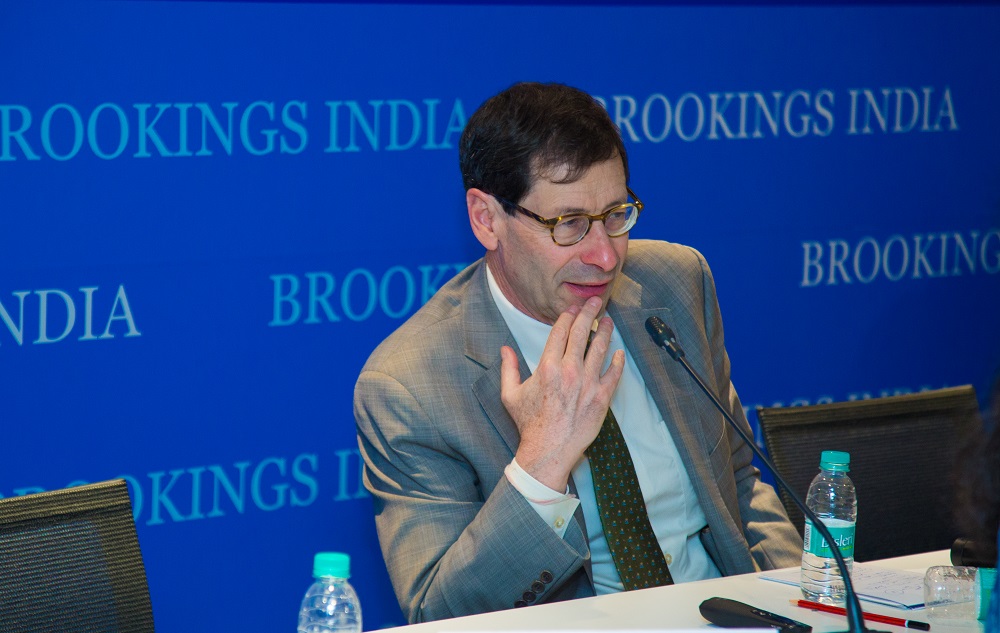
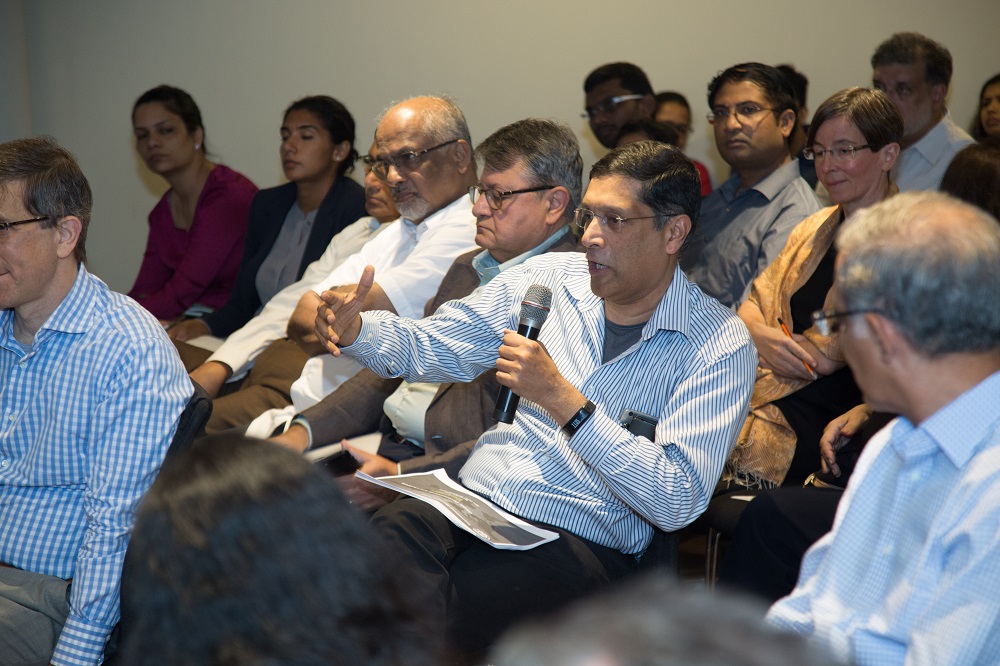
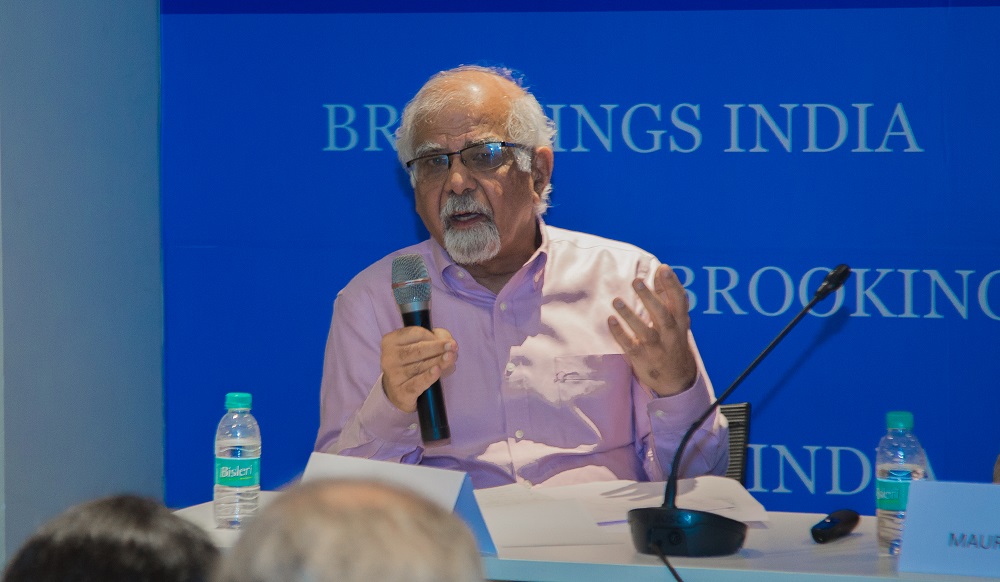
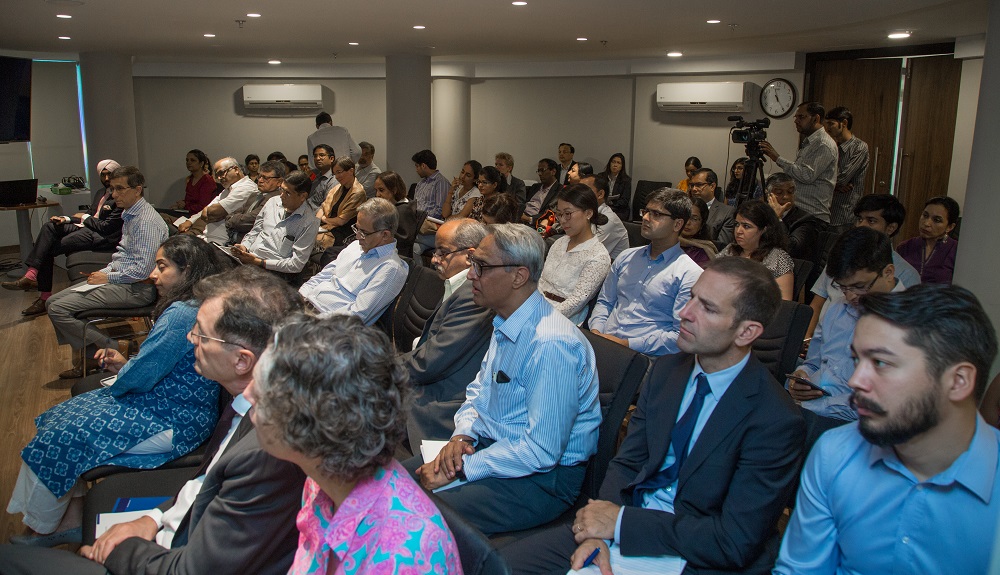
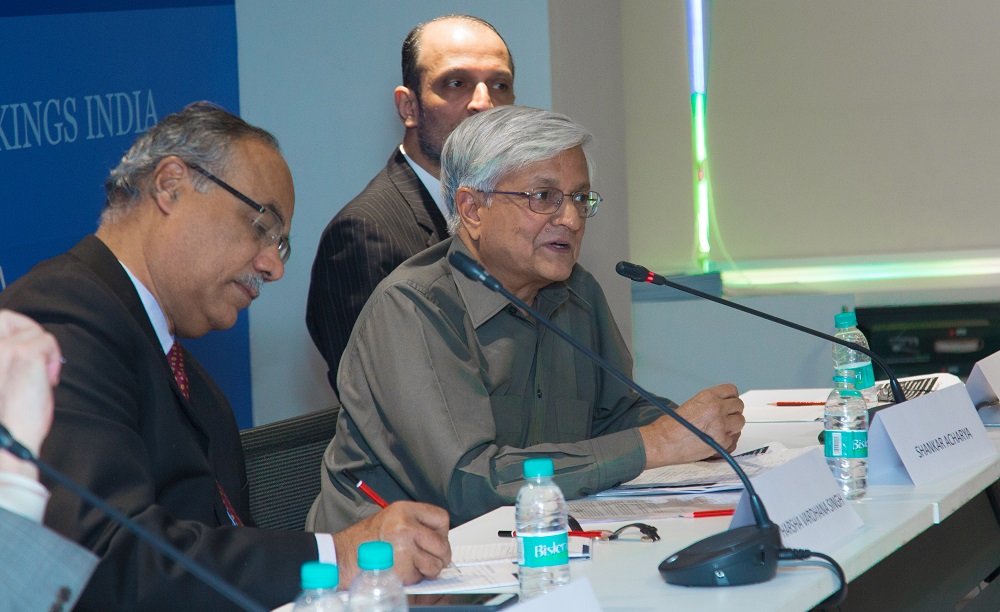
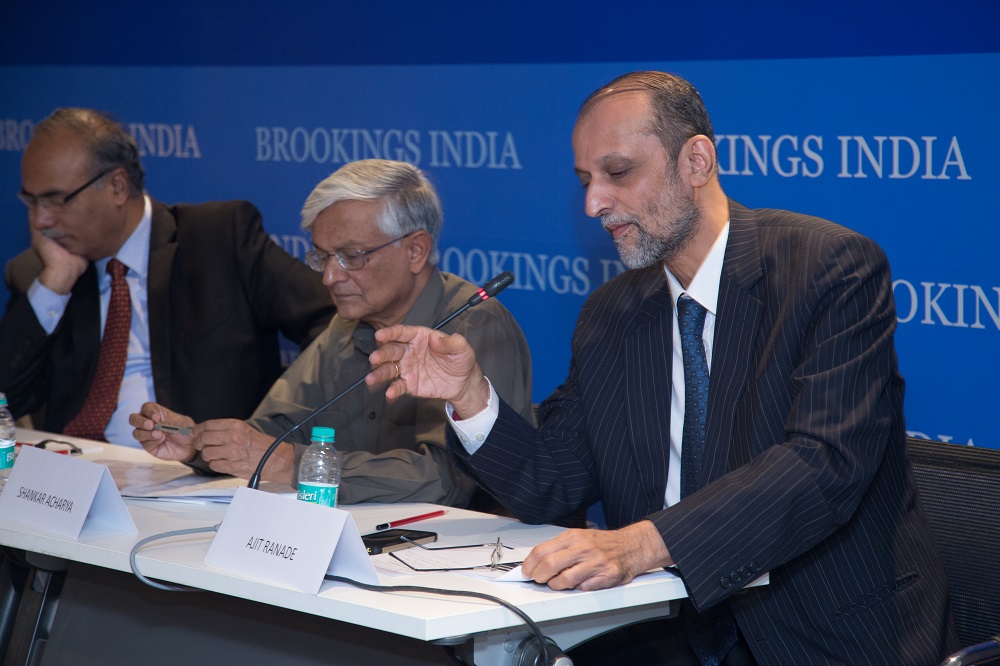
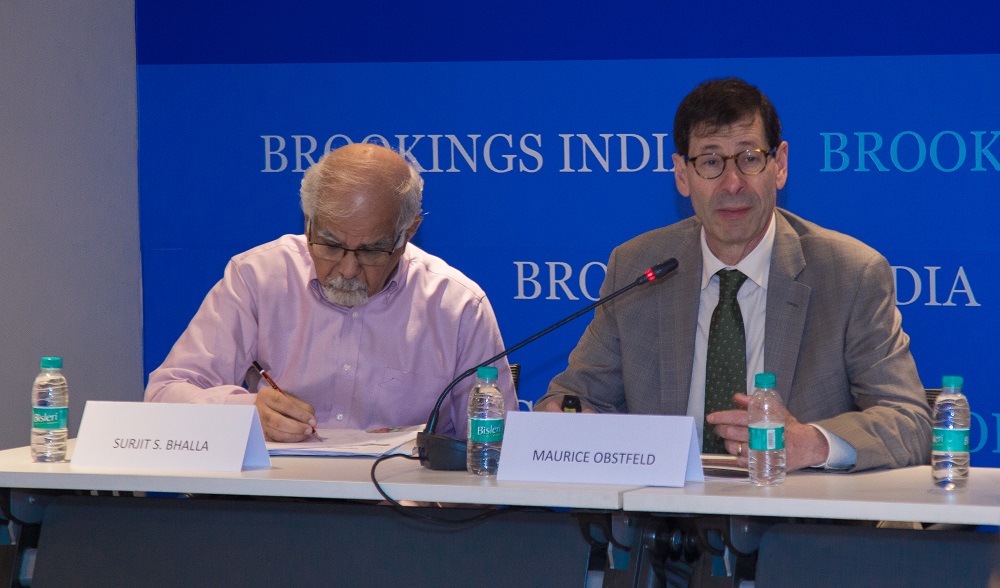
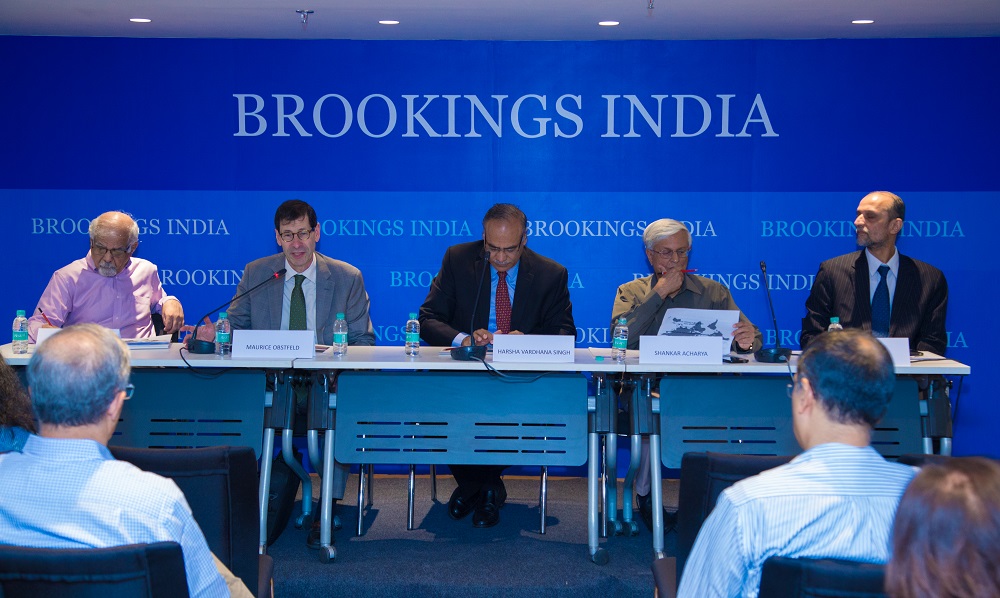
Event Announcement
Brookings India is hosting a public discussion with the IMF’s Research Director and Chief Economist, Maurice Obstfeld, on the IMF’s recent World Economic Outlook (WEO).
The global economy continues to face persistent economic and political challenges within a slow-growth environment. Informed and substantive analysis is required to better understand and prepare the ground to address the cumulative problems arising due to many concerns, such as, the political and economic ramifications of the situation in Europe, difficult economic prospects faced by low-income commodity exporters, China’s need for robust economic performance in a situation with low global demand and difficult conditions in the financial sector, and the recent forecast by the WTO that international trade growth this year will be the slowest since the financial crisis. These concerns regarding the ongoing slow economic and trade growth were strongly emphasized recently by the IMF, based on the insights from the analytical chapters of its WEO (launched on 27th September 2016). Policymakers and analysis, now more than ever, must offer alternative narratives about these long-term developments that counter popular ones that blame all troubles on globally-oriented markets.
The IMF’s WEO is a very important contribution to the analysis of relevant issues and potential solutions for these complex challenges. The October 2016 WEO has introduced new research-based insights based on its assessment of the spillover effects in the analytical chapters of the IMF’s WEO launched recently; the overview first Chapter is to be released on 4th October 2016. The analytical chapters focus on some key contemporary issues, i.e. ‘What’s behind the slowdown?; Global disinflation in an era of constrained monetary policy; and, spillovers from China’s transition and from migration.’
At the Brookings India event on 14th October 2016, Mr Obstfeld will be joined by three distinguished discussants providing their perspectives on the issues. This will be followed by a general discussion.
Speakers
Maurice Obstfeld, Research Director (Chief Economist), IMF
Shankar Acharya, Honorary Professor, ICRIER
Surjit S. Bhalla, Senior India Analyst, The Observatory Group
Ajit Ranade, Chief Economist, Aditya Birla Group
Moderator
Harsha Vardhana Singh, Executive Director, Brookings India

Homi Kharas, Charlotte Rivard
April 16, 2024

Homi Kharas, Vera Songwe
April 15, 2024

Douglas A. Rediker
April 15, 2024